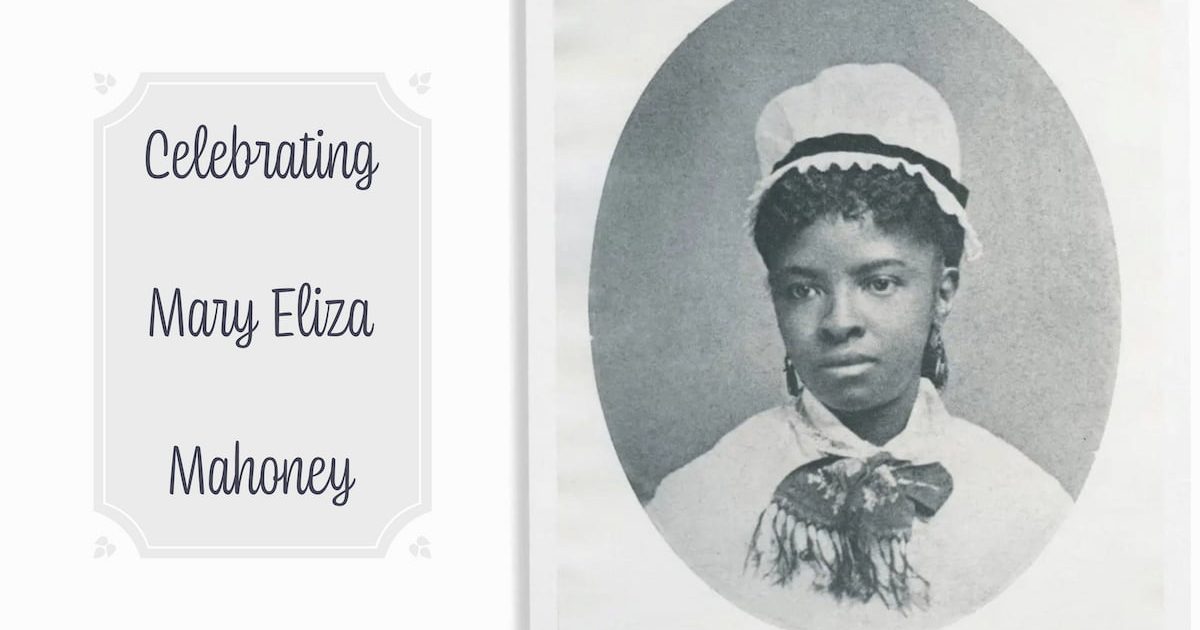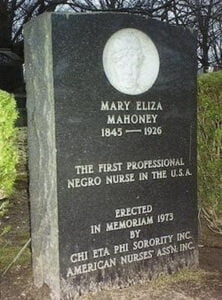
Disclosure: All products recommended in Living Up Blog have been selected by the founder and contributing authors. Some posts include...
Mary Eliza Mahoney, born free from slavery before emancipation in the United States, became a nurse and, against the odds, became the first African American to earn a professional nurse license. She exemplifies greatness, hard work, perseverance, and empathy. Her story comes to this blog as an inspiration for Black History Month in February but easily transitions into Women’s Month in March. Beyond her professional career as a nurse, she advocated for education, the care of black orphan children, and women’s rights, being among the first women to register to vote.

Mary Eliza Mahoney was a nurse who would have loved to work in public hospitals but chose not to because of racial discrimination against people like her, even in Boston, where she was born to freed slaves before the emancipation proclamation. Mahoney is a perfect example of perseverance and integrity. As a young girl, she went to work at a women’s and children’s hospital because she wanted to help people. She learned she could become a nurse if she passed the requirements and exams, which she did, demonstrating her capacity for hard work and learning complex concepts. Mary Eliza Mahoney inspires you to do what you want aligns with you, set your mind to it, and do it because you can.
Mary Eliza Mahoney was a nurse who would have loved to work in public hospitals but chose not to because of racial discrimination against people like her, even in Boston, where she was born to freed slaves before the emancipation proclamation.
Mahoney is a perfect example of perseverance and integrity. As a young girl, she went to work at a women’s and children’s hospital because she wanted to help people. She learned she could become a nurse if she passed the requirements and exams, which she did, demonstrating her capacity for hard work and learning complex concepts.
Mary Eliza Mahoney inspires you to do what you want aligns with you, set your mind to it, and do it because you can.
Born in the Spring of 1845 to freed slaves that had moved to Boston from North Carolina to Charles Mahoney and Mary Jane Seward Mahoney. Her work at the New England Hospital for Women and Children, an exceptional place staffed entirely by women due to the lack of equal service for women, was the inspiration to become a nurse as it housed medical, surgery, obstetrical, and pediatric care in the same hospital. The hospital was also the first to operate a nursing school, and after 15 years of work there, she enrolled in a professional graduate school for nursing. After 16 months and out of 42 students, in 1879, she was one of the few who completed the rigorous program and the first African American in the US to earn a professional nursing license.
Although slavery was abolished in Massachusetts in 1781, the black community in Boston was constantly growing with free and escaped blacks from southern states. And being the home to many abolitionists, racial discrimination was plain. Seeing the overwhelming discrimination African Americans faced in public workplaces, Mahoney decided to work as a private nurse, which allowed her to practice her career and develop among her many talents, being efficient, patient, and a caring bedside manner, according to the biography written by the National Women’s History Museum.
While completely engaged in her patients and nursing career, Mary Eliza Mahoney was also a strong advocate for women’s rights. When the 19th Amendment to the U.S. Constitution: Women’s Right to Vote was passed, a struggle that “took decades of agitation and protest” and supporters who tirelessly lobbied, protested, “and practiced civil disobedience to achieve what many Americans considered a radical change of the Constitution,” she was one of the first women to register and vote. (National Archives, 2021)
“As I reflect on the legacy of this trailblazing nurse, I am in awe for what she accomplished in both her personal and professional life in the face of tremendous adversity and racism. Mary Eliza Mahoney was an impactful leader, innovator and visionary for both nursing practice and civil rights. She embodied the core values of nursing practice before they were even articulated on paper. She was a light in her generation who proclaimed and fought for diversity and health equity.”
Jennifer Mensik Kennedy (ANA, 2022)
Mary Eliza Mahoney was a trailblazing figure in nursing history, women’s rights, and African-American civil equality, but her strength was to leave an indelible mark on the profession. In 1936, the National Association of Color Graduate Nurses (NACGN established the Mary Mahoney Award to recognize her contributions to interracial relationships. (Doona, 2018).
Her grave in Woodlawn Cemetery “in Everett, Massachusetts, has also become a memorial site. In 1973, Helen S. Miller, winner of the Mahoney Award in 1968, led a fundraising drive to erect a monument to Mahoney at the gravesite.” (Spring, 2017)
Her remarkable journey includes:
Mahoney’s extraordinary personal career and advocacy efforts impacted nursing, women, and the African American community overall. Just four years after her death, the number of Black women in the nursing profession more than doubled. She is remembered as an expert, tender practitioner, exemplary citizen, and tireless worker.
NACGN established the Mary Mahoney Award in her honor in 1936, recognizing significant contributions to equal opportunities in nursing for minority groups. To this day, the ANA still awards nurses the Mary Eliza award biennially. She was inducted into the Nursing Hall of Fame in 1976 and the National Women’s Hall of Fame.
Mary Eliza Mahoney’s resilience, dedication, and advocacy continue to inspire nurses and shape the path toward equality and excellence in healthcare. This is indeed prominent today, especially after the 2020 pandemic when a crisis developed due to the shortage of nurses. Mary Eliza Mahoney “advanced the nursing profession by fostering high standards of nursing practice and confronting issues affecting professional nurses” (H. Con. Res. 386, 2006)
ANA President, Jennifer Mensik Kennedy, stated on Mary Eliza Mahoney, in 2023 at the ANA Racial Reckoning – Inaugural Lecture Series,

Mahoney was the first black woman to graduate from the New England Hospital for Women and Children Training School for Nurses program in 1879, 16 months after having enrolled in the hospital’s nursing program at 33 years old. Mary Eliza Mahoney became the first Black woman to hold the professional nursing license. Due to an oppressive discriminatory life for African Americans, she focused her work as a Private-Duty Nurse and was known for her strict professionalism and kind demeanor.
In addition, she advocated for Equality and Women’s Suffrage. She become an early member of what would later be the American Nurses Association (ANA) and co-founded the National Association of Colored Graduate Nurses (NACGN) in 1908. She passionately advocated for equality in nursing education and supported women’s suffrage, when the 19th Amendment was ratified in 1920, Mahoney, at the age of 76, became one of the first women in Boston to register to vote.
Sources:
ANA. (4 May 2022) ANA Racial Reckoning: Inaugural Lecture Series Honors Trailblazer Nurse Mary Eliza Mahoney. American Nurses Association, News, Releases, 2023.
ANA. (n.d.). Hall of Fame Inductees 1976. American Nurses Association.
Doona, M. E. (2018). Mary E. Mahoney. American Association for the History of Nursing (AAHN).
Fielding, S. (19 Feb 2022). Overlooked No More: Mary Eliza Mahoney, Who Opened Doors in Nursing. The New York Times.
Find a Grave. (08 Jun 2003). Mary Eliza Mahoney (16 Apr 1845–4 Jan 1926). Find a Grave Memorial ID 7633551, citing Woodlawn Cemetery, Everett, Middlesex County, Massachusetts, USA.
H. Con. Res. 386. (2006). Honoring Mary Eliza Mahoney, America’s First Professionally Trained African-American Nurse. Congressional Record (Bound Edition), Volume 152 (2006), Part 13, Pages 18489-18491, U. S. Government Publishing Office, www.gpo.gov.
National Archives. (03 Aug 2021). 19th Amendment to the U.S. Constitution: Women’s Right to Vote. National Archives, America’s Historical Documents.
Reiskind, M. (1995). Hospital Founded by Women for Women. Jamaica Plain Historical Society. Victorian, Women’s History, Medical.
Spring, Dr. Kelly A. (2017). Mary Eliza Mahoney (1845-1926). National Women’s History Museum, Education, Resources, Biographies.
Wikipedia. (05 Mar 2024). History of African Americans in Boston. Wikipedia, The Free Encyclopedia.
Wikipedia. (27 Feb 2024). Mary Eliza Mahoney. Wiki.

– Mary Eliza Mahoney

Disclosure: All products recommended in Living Up Blog have been selected by the founder and contributing authors. Some posts include...

Disclosure: All products recommended in Living Up Blog have been selected by the founder and contributing authors. Some posts include...

Indian spices and culinary history dates back millennia, used both dried and fresh produce unique dishes, but it's hard to...

Diwali, the Festival of Lights, is a significant Hindu celebration symbolizing the triumph of light over darkness. Celebrated by Hindu...

Many of us love mushrooms and others just started noticing them. They gained the spotlight and surged in popularity, because...

Disclosure: All products recommended in Living Up Blog have been selected by the founder and contributing authors. Some posts include...